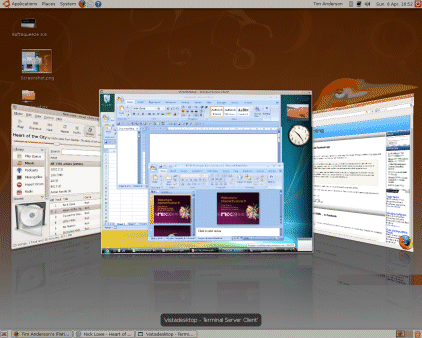I interviewed Sun CEO Jonathan Schwartz last week, and wrote it up for Guardian Technology. By the way, the picture is much better in the print edition.
Sun is gambling on open source – not only open source, but free software. This is possibly easier for Sun that it would be for, say, Microsoft or Oracle, because Sun, like Apple, is a hardware company. You can therefore think of the software as an overhead for selling the hardware. It is not without risk though – most of the software (including its Solaris operating system) runs on commodity x86 hardware as well as on Sun’s SPARC processors.
Not everything we discussed made it into the Guardian piece. I put it to Schwartz that Sun has historically done a poor job of monetizing the software it gives away. For example, it made Java the most popular programming language in the world, with huge enterprise adoption, yet until recently the company was posting losses. I then asked whether he considered that the fundamental open source model – give away the software, make money on support and services – was the future for the whole industry, rather than just for Sun and a few others?
I think first of all our strategy is to build the broadest global communities we can, and then from those communities to identify the opportunities to make money by building datacenters and by building the technologies that go into those datacenters. Software, systems, services, and microelectronics. So right now, in responding to the question is that the future of the industry, right now if you’d like a free Microsoft-office compatible Office suite, you could go to OpenOffice.org, download it, as roughly 100 million people have done in the past couple of years, and you’d have to pay nothing. Or, you could go to your local retailer and pay for the latest proprietary office suite. So if you were a betting man, and you looked at 3.3 billion people online today, where do you think the majority of them will acquire their office productivity suites? They’ll probably acquire the free ones, by definition those will be the most popular.
Now the same thing would apply to search. If you wanted to be in the search business can you imagine trying to run a search portal today, charging customers 50 cents per search? You’d probably have no takers. So, if you want to be the broadest supplier of volume technology into the marketplace, the only acceptable price tag is free.
We are in fact interested in pursuing the broadest global developer community possible, for whom the only acceptable price is free. So I think, if you’re going to try to compete against our virtualization products, our office productivity products, our network infrastructure products, you have to come to the table with a free product. Absent a free product, you won’t even be considered by the majority of the marketplace. So right now I believe we stand alone in having evolved our business model to actually monetize that community. That’s exactly what we’re doing, every day. So when people ask, when will you monetize those free software downloads, again, we had 7% operating margin last quarter. It’s not going to be a single line item, it’s going to be the whole company’s market opportunity expanding. So I feel very comfortable that this is not only the direction for Sun, and it’s a great direction, it’s the direction for the industry. The move towards free software is unstoppable. Not simply in your home, but at your workplace.
Note that it helps to consider this in a global context, not just the traditional highly developed locations like Europe or the USA.
Is he right? The world’s biggest and most profitable tech companies are not built on open source. IBM, Microsoft, Apple, Oracle, Google, for example. All these companies flirt with open source, even make real and meaningful contributions, but they keep their prize jewels proprietary.
Bottom line: Schwartz may well be right, but he’s not right yet. Still, follow the trend. Free software continues to improve; the proprietary vendors are giving away more of their stuff; the cloud is growing in importance relative to the desktop; and tough economic times are likely in tech’s most profitable markets. I doubt Sun will be the only company to change its business model.

